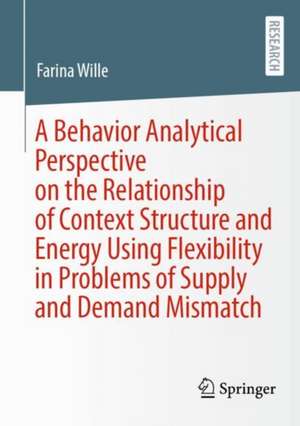A Behavior Analytical Perspective on the Relationship of Context Structure and Energy Using Flexibility in Problems of Supply and Demand Mismatch
Autor Farina Willeen Limba Engleză Paperback – 23 sep 2021
Preț: 581.65 lei
Preț vechi: 684.30 lei
-15% Nou
Puncte Express: 872
Preț estimativ în valută:
111.32€ • 115.33$ • 92.90£
111.32€ • 115.33$ • 92.90£
Carte tipărită la comandă
Livrare economică 21 martie-04 aprilie
Preluare comenzi: 021 569.72.76
Specificații
ISBN-13: 9783658356125
ISBN-10: 365835612X
Pagini: 261
Ilustrații: XXXIII, 261 p. 143 illus., 50 illus. in color.
Dimensiuni: 148 x 210 mm
Greutate: 0.35 kg
Ediția:1st ed. 2021
Editura: Springer Fachmedien Wiesbaden
Colecția Springer
Locul publicării:Wiesbaden, Germany
ISBN-10: 365835612X
Pagini: 261
Ilustrații: XXXIII, 261 p. 143 illus., 50 illus. in color.
Dimensiuni: 148 x 210 mm
Greutate: 0.35 kg
Ediția:1st ed. 2021
Editura: Springer Fachmedien Wiesbaden
Colecția Springer
Locul publicării:Wiesbaden, Germany
Cuprins
Introduction.- The Role of Behavior in a Renewable Based Energy System.- How to Look at Shifting Energy Using Behavior: Theoretical Analysis of Behavioral Variability.- Empirical Analysis of Behavioral Variability.- From Variability to Shifting Appliance Using Behavior for Demand Side Management Purposes.- The Conclusion: One Needs to Lift Context Restrictions.- Relevance of Results for Other Intervention Approaches.- Outlook.- Critical Appraisal.
Notă biografică
Farina Wille works as scientific assistant in the Institute of Psychology at the Technische Universität Braunschweig.
Textul de pe ultima copertă
Enabling an integration of large amounts of variable renewable energy (VRE) into an energy system is an important contribution to reduce part of its associated carbon dioxide emissions. A resulting challenge from integrating VRE is an increase in mismatch between supply and demand which could be reduced by increasing demand side flexibility in the residential sector by shifting energy using behavior. This thesis offers a theoretical and empirical analysis of energy using flexibility based on behavior analysis principles to relate what it can mean to account for a human dimension in an electrical energy system. To characterize degrees of freedom in allocating behavior and options for flexibility of energy using behavior, variability of behavioral patterns in terms of homogeneity between individuals is analyzed. Notably, even in times for which one could principally expect more variability between behavioral patterns such as in the afternoon and evening, one finds that behavioral activities are pre-structured, clearly limiting the possibilities for shifting energy using behavior. The behavior analytical perspective highlights the importance of addressing context structure and associated behavioral effort for shifting behavior, when addressing the challenge of mitigating the mismatch problem for a more sustainable energy system.
About the author
Farina Wille works as scientific assistant in the Institute of Psychology at the Technische Universität Braunschweig.
Farina Wille works as scientific assistant in the Institute of Psychology at the Technische Universität Braunschweig.
